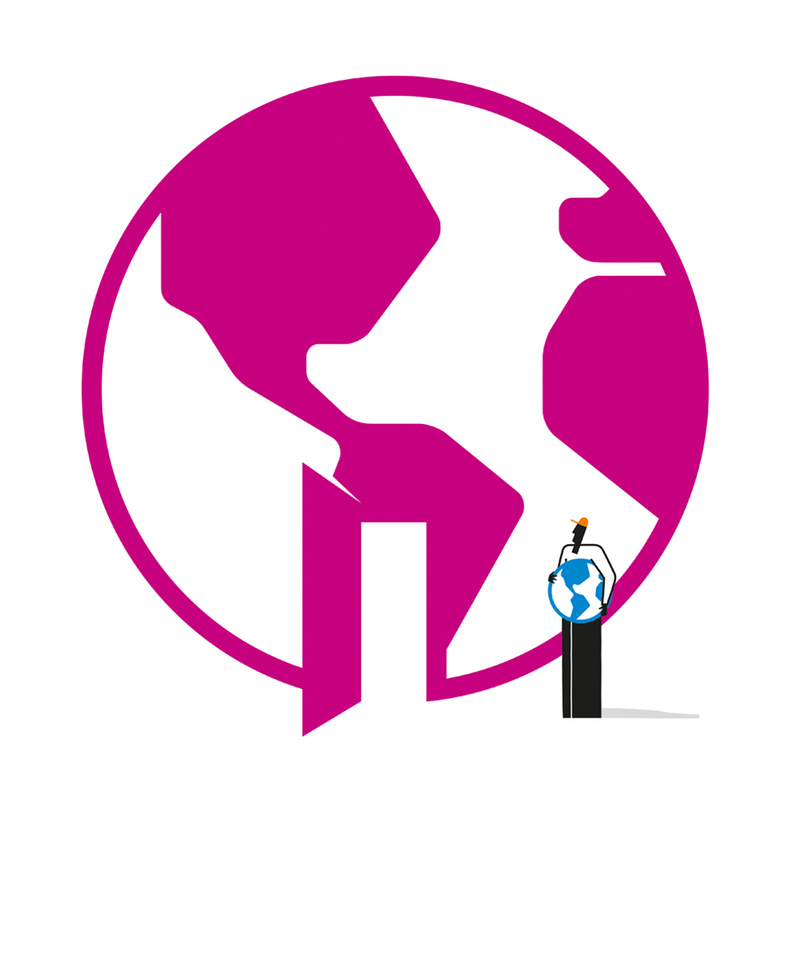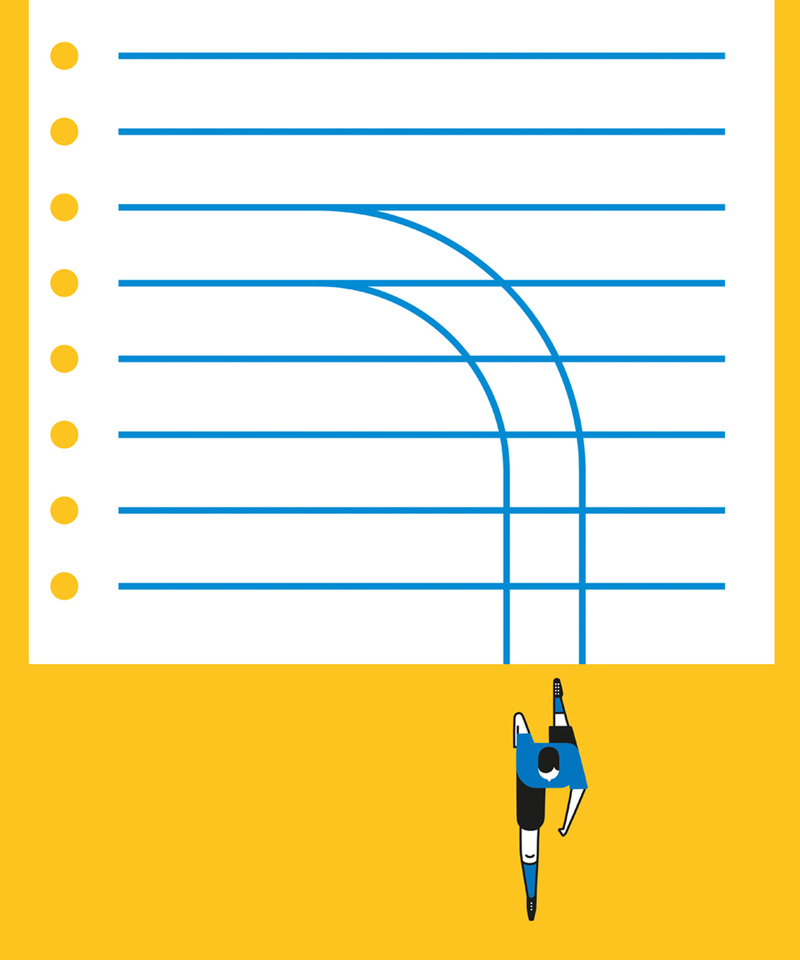
This is what employers say they are looking for, time and again. It’s why, Denison President Adam Weinberg says, liberal arts students are the best equipped to adapt and succeed in an ever-changing world. But Denison can’t rest on its liberal arts laurels and watch the world evolve without a little evolution of its own. To continue to engage students—in areas that alumni, parents, and employers tell us students need—the Denison faculty developed and approved seven new academic programs, including new majors in global commerce; data analytics; and health, exercise, and sport studies. Global programs also are being expanded through Denison Seminars, which often include an off-campus travel experience. The College, says Provost Kim Coplin ’85, has added academic programs that take advantage of our strengths, while keeping us rooted in the liberal arts. They create natural ways for students to get out of the classroom, to work on real problems, and to make thoughtful choices about what they want to do.
Here’s how those new programs are taking shape, along with the future of the liberal arts at Denison. —SHS
The View from Two
Othello may have calmed an angry mob by telling them to sheathe their swords “for the dew will rust them.” But students in one Denison Seminar find themselves drawing weapons. A lot.
Denison Seminars, often co-taught by faculty of different disciplines, are designed to encourage sophomores and juniors to engage deeply in a topic, exploring it in ways that are interdisciplinary, academically rigorous, and—in the case of “Shakespeare by the Sword”—physically challenging. The seminar taught by associate professors Peter Grandbois and Cheryl McFarren (English and theatre departments, respectively), approaches the Bard’s work by studying combat scenes.
McFarren teaches acting; Grandbois teaches writing and happens to be a former member of the U.S. National Fencing Team. Together they get students on their feet to encounter the action and emotion of a play and its characters on a visceral level.
“The idea of the seminars is that students are taking an interdisciplinary course outside of their usual realm of study,” says Grandbois. “So they are risking something, studying something new. In this case, they are involved in combat and acting … looking at the meter, embodying the lines, understanding the characters at their most intense physical moments.”
Since the new program was developed, several other seminars have taken shape, including one that focused on divided cities (complete with a trip to Berlin), co-taught by faculty members in history and cinema, and another on the martial arts, co-taught by faculty in modern languages and Denison’s new health, exercise, and sport studies major.
As for “Shakespeare by the Sword,” Grandbois says it’s always surprising to see how readily students from different academic backgrounds recognize that the lessons here are not just about Shakespeare. “They’re taking risks, synthesizing meaning, putting it all together,” he says. “I am amazed at students’ willingness to put themselves on the line.” —LV
Awash in Data
If you’ve flipped on CNN, read The Times or been on Facebook for even a few moments since the 2016 presidential election, you’ve been awash in data. We can’t avoid it. And it’s a great thing to have access to all this information (most of the time).
Whether it’s political data or census, financial, or biological data, there’s no denying that big decisions are being made based on huge amounts of it. But big data doesn’t mean much without careful interpretation—without know-ing the right questions to ask, how to gather the information, how to visualize and present the data, and what ethical implications should be considered before even beginning the process.
That’s what makes data analytics, one of Denison’s newest majors, different.
“We need people who are able to think broadly and understand both the techniques in analyzing the data and the data itself,” explains Jessen Havill, director of the data analytics program. “People who make big-data decisions will become the decision-makers of the future.”
Though there may be a handful of other universities starting up data analytics majors, those programs are based primarily on mathematics or computer science. But from the beginning, Denison’s program was designed as a thoroughly interdisciplinary degree by faculty from the departments of psychology, economics, political science, sociology, biology, mathematics, and computer science. In fact, it’s an interdisciplinary program that’s not associated with any one department. That’s the point.
The first course offered in spring 2017 was purposely team-taught by a mathematician, a political scientist, and a psychologist. The class filled so quickly that a fourth section was added. Two new faculty—a macroecologist, who studies changes in biodiversity from climate change, and an applied mathematician, whose research has been applied in the health field—have been brought on in tenure-track positions.
Denison already offers many opportunities for students in data analytics courses to apply their skills to real-world problems outside the classroom. One team worked with law enforcement in Australia, using police reports to find ways to predict the frequency and severity of domestic violence incidents. The effort was coordinated with University of Cambridge professor and criminologist Lawrence Sherman ’70, who accepts two Denison students for a summer internship with him in England.
Data analytics majors will be well equipped to work in business, marketing, finance, public health, government, education, social policy, law, and medicine, as well as a variety of areas of scientific research. “The skills students learn in our program allow them to create things,” Havill says. “It’s the ability to come up with new solutions instead of boxed solutions.” —SHS

True Story
You don’t need to be an English major to have a story to tell. Denison’s concentration in narrative nonfiction writing was developed so that tomorrow’s scientists, musicians, doctors, and philosophers can convey the facts with narrative skill.
The concentration was formally launched in the fall of 2016, but faculty in the English department have been working for a long time with students who wanted to hone nonfiction writing skills, says Associate Professor Jack Shuler, chair of the program. “We’ve had students in the sciences, in political science, in many fields who were interested in literary journalism.” Some were thinking about careers in journalism or public relations; others wanted to be able to write about their chosen subject matter in a way that would be engaging and accessible to everyone. “We shaped this area of concentration with those students in mind,” he says.
What is narrative nonfiction? It’s good prose that’s rooted in fact-based research and reporting, that pays attention to literary techniques such as character development, plotting, and sense of place. Surgeon Atul Gawande’s elegant, intimate portraits of his patients and their illnesses in New Yorker articles are narrative nonfiction; so is Sam Quinones’ book Dreamland. To build their skills, students take core courses in literary nonfiction as well as creative writing. Their electives in various fields are research- and writing-heavy, and they participate in at least one internship. There are career panels, colloquia, and a semester-long writing project in an area of each student’s choice.
It’s a program that taps into the DNA of so many Denison students; it helps them dive deeply into their passion for exploring and communicating the complexities of the world and the human condition. “We anticipated we’d have five students enrolled in the concentration. Now we have 27,” says Shuler. “Liberal arts students make great writers.” —LV
For more information on Denison’s new narrative nonfiction concen-tration, visit denison.edu/academics/narrative-nonfiction-writing.
Write Stuff
It’s no secret that across the nation, undergrads are having a hard time at the keyboard. Some lack the fundamentals of composition; others simply haven’t been required to do much writing in high school. A 2006 survey by The Chronicle of Higher Education found that high school graduates hadn’t produced a paper longer than five pages. Texting doesn’t count.
Denison students are smart, capable, and accomplished when they arrive on campus. Even so, that doesn’t mean they’re geared up for college-level writing demands. “They haven’t begun to think about writing as a process,” says Megan Threlkeld, associate professor of history and director of the Writing Program, “and they don’t understand that writing is a form of thinking.”
To build those skills, Denison has structured a writing program that has evolved far beyond the freshman comp classes of the 1960s and ’70s. The program begins with first-year writing workshops required of all students—even those who’ve scored well on the composition portion of the A.P. English exam. After their first year, students must take two additional writing-intensive courses, preferably one in their major area of study, and one outside their chosen field. Regardless of their majors, throughout the students’ remaining college careers their instructors work toward the same goal: to cultivate in students an understanding that writing isn’t a separate discipline; it’s part of critical thinking in any field. —L

Thinking Business? Think Bigger.
Preparation to lead and succeed in the business world takes more than a traditional business degree these days.
Students in the new global commerce major learn the fundamentals of economics, statistics, accounting, business language and, yes, they also examine the underlying dynamics of global financial markets. And Denison offers its students much more than traditional business courses might. Global commerce majors study the many dimensions of markets and commerce—including the cultures, histories, religions, and politics of regions around the world. All are factors that are only growing more important in our increasingly complex and globalized society.
The major draws on a strong core of courses across the curriculum, including economics, history, and modern languages. In fact, many of the students who initially declared a global commerce major in fall 2016 already had a strong interest in using and improving the foreign language skills they were developing at Denison.
“This program offers a truly interdisciplinary examination of how commercial activity operates. For example, students need an understanding of cultures in various parts of the world, and how they shape markets,” says Karen Spierling, director of global commerce. “We are involving current faculty and incorporating courses from across the humanities and social sciences, while hiring new faculty who can teach new courses in topics that Denison has not previously offered.”
A crucial aspect of the global commerce major is that students also focus on a region of the world, learning a language and spending time in that region through study-abroad and/or an internship. Starting in 2018, senior global commerce majors will participate in a capstone seminar that connects them to experienced local and alumni practitioners from the business and nonprofit worlds. Their seminar projects will require them to apply their knowledge from the commerce core courses and their regional focus courses to address a problem related to global commerce.
“One unique feature of the program is the way we are taking full advantage of our remarkably accomplished alumni network, our wide range of global programs, and our proximity to Columbus, which has become a large and thriving city,” said Jane Palmer, the program coordinator for global commerce. “We are developing a new lecture series, internship programs, and off-campus experiences, including work with the American University of Paris to offer a summer program called the Summer International Business Program.” —SHS
For more information on Denison’s new global commerce major, visit denison.edu/academics/global-commerce.

Body and Mind
The goal of a classical education was once to equip a citizen to fully participate in civic life—physically as well as intellectually. Today there’s no question that menssana is still important in corpore sano. But the new major in health, exercise, and sport studies (HESS) offers a far broader perspective. It is, says Nan Carney-DeBord ’80, director of athletics and chair of the department, “rooted in the liberal arts and global in its approach.”
When Carney-DeBord returned to her alma mater six years ago, Denison offered a major in athletic training. It was very restrictive, she says. “It didn’t feel like it fit as well as it could in the liberal arts curriculum.” The new HESS major blends campus studies and research with outside-the-classroom experience and career mentoring.
Some HESS students are interested in health professions—nursing, public health, medicine; others in the science of exercise and athletics. Still other students see the major as a foundation for a future in sports law, sports administration, or marketing. All take a core of classes in their areas of focus, plus electives related to their fields. When they declare as HESS majors, they identify courses appropriate to their career goals, and then they write personal narratives that lay out their interests and how the classes fit in.
That early writing exercise is key, says Associate Professor Brian Hortz ’94. “It makes them think through their choices.” Equally valuable: the time between terms. Summers and semester breaks are when internships, externships, and alumni visits put theory into practice. “It creates a broad experience to help them understand what’s working,” Hortz says. Finally, as seniors, students make formal presentations about their work. Hearing what upperclassmen have done is great guidance for younger students, he notes. “It gets them thinking—‘Can I plug into that?’” —LV
For more information on Denison’s new health, exercise, and sport studies major, visit denison.edu/academics/health-exercise-sport-studies.
Fueling the Fire
To be at the top of the game in business, you have to keep moving forward, stay ahead of trends, and be able to adapt to change—fast. People who don’t have the ability to think broadly and boldly are more likely to be left behind.
Growth areas in the economy are constantly shifting, too. Research at Denison revealed that the finance, insurance, and real estate (FIRE) sectors of the economy are on the rise, and students’ interest levels confirmed it. So Denison decided to be proactive, creating a launch pad for careers in the field with a new concentration in financial economics.
“The FIRE industries accounted for about 20 percent of the U.S. gross domestic product in 2014,” says Quentin Duroy, associate professor and chair of Denison’s Department of Economics. “Our new concentration will provide students with tools to understand the role of that sector in the U.S. economy.”
Students who are instinctively drawn to financial markets and risk analysis (understanding why stock markets go up or down and comprehending the forecasting of financial variables, such as interest rates and stock returns) study financial economics. Those who have skills in critical thinking, communication, and creative problem-solving—the strength of a liberal arts education—will be propelled into careers across a range of business and finance sectors and become leaders in the field. It also doesn’t hurt that the program connects students with alumni and industries, both globally and in the Columbus metropolitan region, as part of their classes.
Keeping up in business and finance requires some serious skills. The liberal arts roots of the program ensure that stu-dents’ skills will never become obsolete. —SHS
For more information on Denison’s new financial economics concentration, visit denison.edu/financial-economics.

